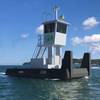Existing international and national regulations do not specifically address shipbreaking, widely regarded as one of the world's most hazardous occupations. Some sites where shipbreaking takes place are referred to as 'time bombs' as they hold potentially dangerous long-term effects for public and environmental health.
"Although working conditions vary from country to country, workers in shipbreaking are exposed to extremely hazardous working conditions with high accident rates leading to injuries and fatalities," said Dr Jukka Takala, director of the International Labor Organization (ILO)'s InFocus Programm on Safety and Health at Work and the Environment.
"Inadequate safety controls, badly monitored operations, exposure to highly toxic substances, a high risk of explosions and a lack of adequate training exacerbate the situation."
The ILO, concerned by the lack of protection for workers in this area, is holding a Tripartite Meeting of Experts on Safety and Health in Shipbreaking from October 7-14 in Bangkok. During the meeting, guidelines for responsible ship dismantling and the provision of support for improved safety and health in shipbreaking will be revised and adopted.
In addition to factors regarding Occupational, Safety and Health (OSH), the ILO is also disturbed by decent work deficits in terms of limits on freedom of association, collective bargaining, social protection, welfare provisions, basic living conditions and training.
"Our long-term objective is to improve the health and safety conditions for workers in shipbreaking operations by transforming it from the informal sector into a sustainable industry in the formal sector, thus contributing to poverty alleviation," Takala explained.
The program aims at the establishment of sound national frameworks for responsible ship dismantling, and the provision of support for improved safety and health in shipbreaking by:
§ Applying relevant ILO international instruments and codes of practice
§ Enhancing social dialogue in OSH
§ Strengthening national legislation and enforcing OSH standards; and
§ Assisting governments, employers and workers through the execution of comprehensive technical cooperation projects aimed at national and enterprise levels
Representatives of government, employers' and workers' groups from Bangladesh, China, India, Pakistan and Turkey are participating in the meeting, supported by resource persons from Canada, Republic of Korea and the United States
Effective shipbreaking largely depends on how the vessel is prepared for dismantling. Although the maritime industry is very well regulated, the end of a vessel's life and its dismantling are not comprehensively covered.
The activities of the Marine Environment Protection Committee of the International Maritime Organization (IMO) and the Basel Convention (United Nations' Environmental Program [UNEP]) on the Control of Transboundary Movements of Hazardous Wastes and Their Disposal are both highly relevant. In light of this situation, senior representatives of these international organizations are actively participating in the meeting.
Featured videos

Tracking Foreign Vessels Working in the U.S. Jones Act Market

Inside the Electrified Truckable Tug

Inmarsat Enhances Service to Drive Digitalization
Subscribe for
Maritime Reporter E-News
Maritime Reporter E-News is the maritime industry's largest circulation and most authoritative ENews Service, delivered to your Email five times per week









